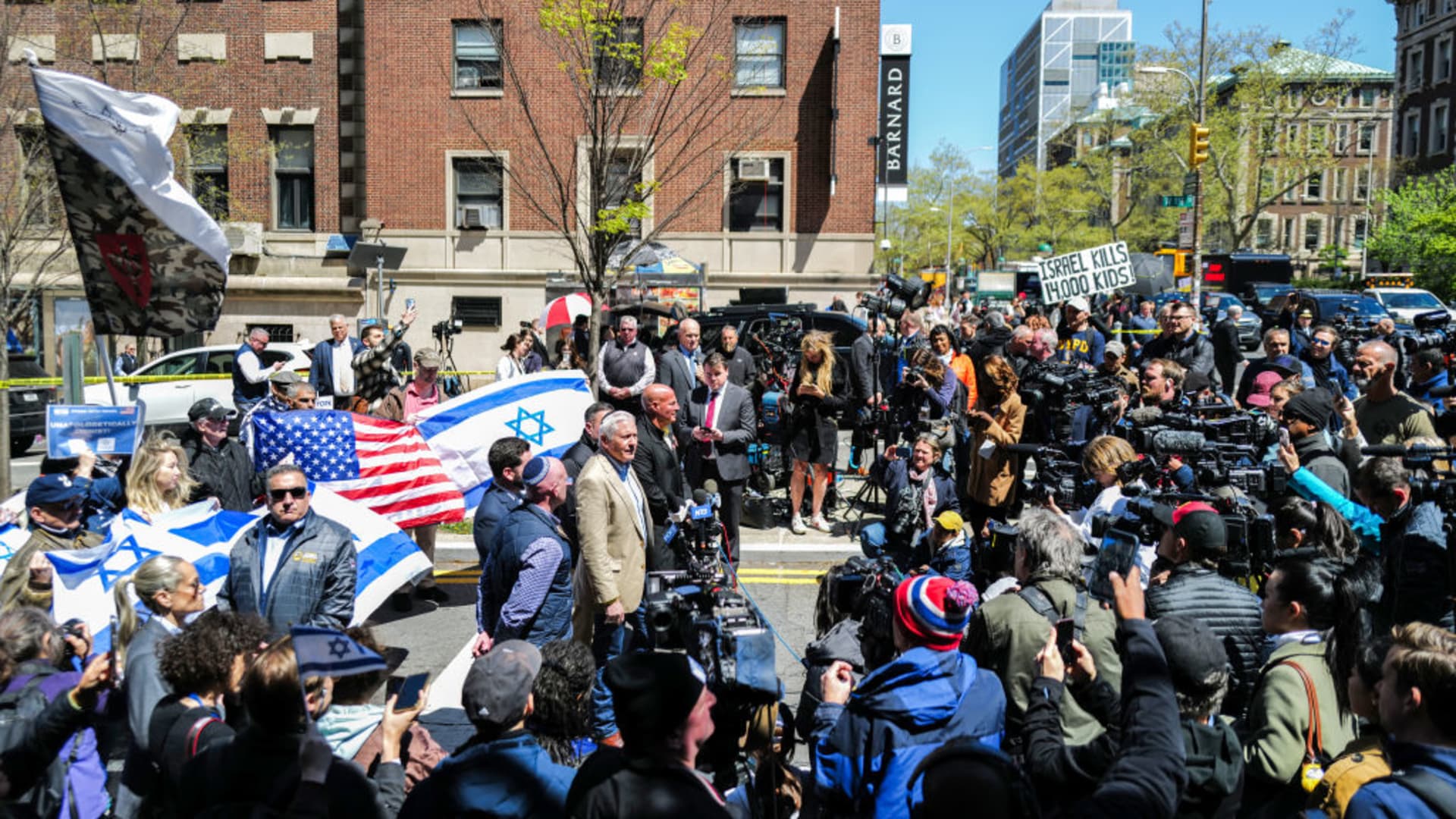Nassau County Executive Bruce A Blakeman speaks in front of the entrance of Columbia University which is occupied by pro-Palestian protesters in New York on April 22, 2024.
Charly Triballeau | AFP | Getty Images
Billionaire donors like Robert Kraft and Leon Cooperman are weighing their support for Columbia University amid rising campus tensions over pro-Palestinian protests.
Friction at Columbia has escalated in recent days, amid reports of antisemitic speech on and around the campus, where students have set up a tent encampment to protest Israel’s bombardment of Gaza.
Kraft, who has donated millions to the school, condemned the protests on Monday, hours after Columbia President Nemat “Minouche” Shafik announced that classes would be held virtually “to deescalate the rancor” of the protests.
“I am not comfortable supporting the university until corrective action is taken,” Kraft said in a statement. “It is my hope that Columbia and its leadership will stand up to this hate by ending these protests immediately and will work to earn back the respect and trust of the many of us who have lost faith in the institution.”
New England Patriots owner Robert Kraft listens to NFL Commissioner Roger Goodell speak to the media over various topics in the league leading up to Super Bowl LIII at the Georgia World Congress Center on January 30, 2019, in Atlanta, GA.
Austin McAfee | Icon Sportswire | Getty Images
Kraft is the chairman and CEO of the Kraft Group and the founder of the Foundation to Combat Antisemitism (FCAS). He also owns the New England Patriots. In 2000, Columbia opened the Kraft Center for Jewish Student Life in his name and in 2007, the school dedicated an athletic field to him “for his extremely generous contributions.”
FCAS and The Kraft Group did not immediately respond to a request for clarification as to whether Kraft’s statement meant he would officially pause his financial contributions to Columbia.
“Columbia is grateful to Mr. Kraft for his years of generosity and service to Columbia,” a Columbia spokesperson said in a statement to CNBC. “This is a time of crisis for many members of our community and we are focused on providing the support they need while keeping our campus safe.”
Kraft’s public disapproval raises questions of whether other high-profile donors will pause their support for the school.
“I can’t say that yet,” Leon Cooperman, Omega Family Office chairman and CEO, told CNBC when asked whether he would follow Kraft’s lead.
He said he would continue donating to Columbia’s business school “when they solicit” him.
“I’m uncomfortable with what’s going on at the school. But you know, I don’t want to hold the administration responsible for demonstrations,” Cooperman said Monday. “It’s these kids that are out of control. They have s— for brains.”
Cooperman and Kraft so far, represent a minority of wealthy Columbia University donors who are speaking out on the protests.
James Gorman, the executive chairman of Morgan Stanley and chairman of the board at Columbia Business School, declined to comment when reached late Sunday about the protests on campus.
David Greenspan, the founder of Slate Path Capital and a member of the Columbia Business School board, also declined to comment, through a spokesperson.
CNBC reached out to half a dozen foundations listed by Columbia University as having given at least $1 million to the school since 2014. None of them returned CNBC’s requests for comment.
Leon Cooperman
Scott Mlyn | CNBC
Columbia Students for Justice in Palestine said the protesters have been unfairly portrayed and that antisemitic comments are coming from extreme individuals who do not reflect the spirit of their movement.
“We are frustrated by media distractions focusing on inflammatory individuals who do not represent us,” the group wrote in a statement on Sunday. “We firmly reject any form of hate or bigotry and stand against non students attempting to disrupt our solidarity.”
The New York Police Department said at a Monday press conference that there had been no reports of physical altercations related to the protests, but that Jewish students had called about receiving hateful comments.
Since Columbia is private property, the NYPD said it would not intervene on campus unless authorized by the school. But it added that officers have a “very large police presence” in the surrounding area.
Last Thursday, NYPD officers conducted a sweep of the protest encampment at the request of University President Shafik and arrested 108 people.
Students protest in support of Palestinians on Columbia University campus, as protests continue inside and outside the university, amid the ongoing conflict between Israel and the Palestinian Islamist group Hamas, in New York City, U.S., April 22, 2024.
Caitlin Ochs | Reuters
Shafik has been under competing pressures from the student body, wealthy donors and government officials.
On April 17, Shafik testified before the House Committee on Education and the Workforce about Columbia’s response to campus antisemitism.
On Monday, Rep. Elise Stefanik, R-N.Y., and nine other House Republicans called on Shafik to step down, for allowing what they called an “illegal, antisemitic encampment.”
“It is time for Columbia University to turn the page on this shameful chapter. This can only be done through the restoration of order and your prompt resignation,” they wrote in a letter.
Stefanik has made this kind of Ivy League outrage part of her political brand.
During a congressional hearing on antisemitism in December, Stefanik censured the presidents of Harvard University, the University of Pennsylvania and the Massachusetts Institute of Technology for wavering on the question of whether calling for the genocide of Jews would violate their colleges’ free speech protections.
That incident spurred a revolt, led by conservatives and wealthy donors, which ultimately resulted in the resignations of Harvard and Penn’s presidents.
